The History Book Club discussion

This topic is about
The Splendid and the Vile
BUDDY-READS
>
ARCHIVE - BUDDY READ - THE SPLENDID AND THE VILE: A SAGA OF CHURCHILL, FAMILY, AND DEFIANCE DURING THE BLITZ - DISCUSSION THREAD (No Spoilers, please)
 Chapter 27 - Directive 17 - So this paragraph illustrates the German/Goring arrogance about their ability - to destroy the threat of the RAF easily was the arrogant "dream wish" of Goringl - fed by the likely arrogant Schmidt appraisal of British RAF strength.
Chapter 27 - Directive 17 - So this paragraph illustrates the German/Goring arrogance about their ability - to destroy the threat of the RAF easily was the arrogant "dream wish" of Goringl - fed by the likely arrogant Schmidt appraisal of British RAF strength.This "chapter" again is so brief and I do believe it could easily have been incorporated into the following chapter - maybe due to the book trying to go over such a short period - I didn't realize this when I started the book - I was drawn to both Churchill and Larson - I am not sorry but the chapters almost seem to have to be viewed as long paragraphs.................maybe
 Chapter 28 - so interesting Churchilll's comments on brevity - my normal writing style - referred to by professors and teacher when I was in school as "telegraphic style" using I guess dashes instead of "stops" might have been appreciated by Winston - but what I would have done writing to a head of state might have been different.
Chapter 28 - so interesting Churchilll's comments on brevity - my normal writing style - referred to by professors and teacher when I was in school as "telegraphic style" using I guess dashes instead of "stops" might have been appreciated by Winston - but what I would have done writing to a head of state might have been different.The ability of Churchill and crew to escape to dinners and have poems like the Moon poem conjured up and enjoyed was likely a needed relaxation (of course I don't know how I would see that for a fellow who lingered in the bath in daytime etc) and of course the likely really candid opportunity to discuss the situation in the aftermath of the dinners etc. Maybe I see this as a more cherished thing in this time of Covid - we dont have any casual after dinner talk except with our immediate family or partners. It is a loss that we will need a long time to recover from if we ever can.
But even here the arrogance of the Germans in preparing for a victory parade in Berlin before the attack on the RAF is even begun - again the reporting of my friend Shirer - (I wonder if I should look at all the footnotes?)
 Chapter 29 - Eagle Day - so again we see Gorings ego coming through - trying to amass 2300 aircraft for same time attacks on the RAF - counting the aircraft rather than the targets??? - anyway
Chapter 29 - Eagle Day - so again we see Gorings ego coming through - trying to amass 2300 aircraft for same time attacks on the RAF - counting the aircraft rather than the targets??? - anywayUsing the comments of Galland, the German pilot, Goring was out of touch - did not even see the British radar as a problem. I agree that with the lack of effective resistance that the Luffwaffe had met - or not met - in their earlier endeavors might well have lubricated the path to arrogance and overconfidence
 Vincent, you might compare the florid orator, Winston Churchill, to the equally verbose Henry James (a slightly older contemporary). And when it comes to the brevity of Larson’s chapters, I think it has to do with artistic license and the short attention spans of today’s reading public — i.e., look at the popularity of USA TODAY. But I think you’re spot on about the unbelievable arrogance of the Germans .... thank goodness they overestimated themselves!
Vincent, you might compare the florid orator, Winston Churchill, to the equally verbose Henry James (a slightly older contemporary). And when it comes to the brevity of Larson’s chapters, I think it has to do with artistic license and the short attention spans of today’s reading public — i.e., look at the popularity of USA TODAY. But I think you’re spot on about the unbelievable arrogance of the Germans .... thank goodness they overestimated themselves!Regards,
Andrea
This coming week's assignment:
Week Eleven - August 3rd - August 9th
Chapter 30: Perplexity
Chapter 31: Göring
Chapter 32: The Bomber in the Pasture
Week Eleven - August 3rd - August 9th
Chapter 30: Perplexity
Chapter 31: Göring
Chapter 32: The Bomber in the Pasture
message 208:
by
Bentley, Group Founder, Leader, Chief
(last edited Aug 02, 2020 10:26PM)
(new)
-
rated it 4 stars
And so we begin:
CHAPTER 21
Champagne and Garbo
"ON WEDNESDAY, JULY 10, GAY Margesson visited Colville in London. They saw the Strauss operetta operetta Die Fledermaus, performed in English. Most of the audience loved the humor; Colville and Gay did not, and left in the middle of the third act. “In the intervals,” he wrote in his diary, “Gay insisted on talking politics, about which she is as ignorant as she is prejudiced, and indulging in recriminations of Chamberlain and his Government. For the first time since I have known her I found her definitely tedious and puerile.”
As Colville himself admitted, by looking for faults in Gay he hoped to ease the hurt of her steadfast unwillingness to return his affections. But he could not help it: He was still in love.
Source: Larson, Erik. The Splendid and the Vile (p. 129). Crown. Kindle Edition.
Discussion Topics and Questions:
1. Does anyone else think that the author's obsession with Jack Colville's unrequited love with Gay to be a bit unbalanced? I honestly have no idea why he keeps adding more about this insignificant relationship and devoting filler chapters to this topic. Does anyone else feel that it detracts from the book and tarnishes the work?
CHAPTER 21
Champagne and Garbo
"ON WEDNESDAY, JULY 10, GAY Margesson visited Colville in London. They saw the Strauss operetta operetta Die Fledermaus, performed in English. Most of the audience loved the humor; Colville and Gay did not, and left in the middle of the third act. “In the intervals,” he wrote in his diary, “Gay insisted on talking politics, about which she is as ignorant as she is prejudiced, and indulging in recriminations of Chamberlain and his Government. For the first time since I have known her I found her definitely tedious and puerile.”
As Colville himself admitted, by looking for faults in Gay he hoped to ease the hurt of her steadfast unwillingness to return his affections. But he could not help it: He was still in love.
Source: Larson, Erik. The Splendid and the Vile (p. 129). Crown. Kindle Edition.
Discussion Topics and Questions:
1. Does anyone else think that the author's obsession with Jack Colville's unrequited love with Gay to be a bit unbalanced? I honestly have no idea why he keeps adding more about this insignificant relationship and devoting filler chapters to this topic. Does anyone else feel that it detracts from the book and tarnishes the work?
message 209:
by
Bentley, Group Founder, Leader, Chief
(last edited Aug 02, 2020 10:38PM)
(new)
-
rated it 4 stars
And so we begin:
CHAPTER 22
Have We Sunk So Low?
"ENGLAND BRACED FOR INVASION. TROOPS piled sandbags and built machine-gun nests near the Palace of Westminster, home to Parliament and Big Ben. In Parliament Square, a small fortified redoubt—a pillbox—was disguised as a W. H. Smith book kiosk. Sandbags and guns adorned the grounds of Buckingham Palace, where the masses of tulips in the palace gardens were, according to New Yorker writer Mollie Panter-Downes, “exactly the color of blood.”
The queen began taking lessons in how to shoot a revolver. “Yes,” she said, “I shall not go down like the others.” In Hyde Park, soldiers dug anti-tank trenches and erected obstacles to prevent German gliders from landing troops in the heart of London.
A government pamphlet pamphlet on how to behave during an invasion warned citizens to stay in their homes and not attempt to run, “because, if you run away, you will be machine-gunned from the air, as were civilians in Holland and Belgium.”
Source: Larson, Erik. The Splendid and the Vile (p. 130). Crown. Kindle Edition.
Discussion Topics and Questions:
1. What were your thoughts about the warnings given to the British people:
A government pamphlet pamphlet on how to behave during an invasion warned citizens to stay in their homes and not attempt to run, “because, if you run away, you will be machine-gunned from the air, as were civilians in Holland and Belgium.”
Source: Larson, Erik. The Splendid and the Vile (p. 130). Crown. Kindle Edition.
2. Did you agree with this assessment - why or why not?
The BBC announcer, Charles Gardner, turned the battle into a blow-by-blow account that had more in common with a soccer commentary than a report on a mortal encounter over the channel.
This struck many listeners as unseemly.
A London woman wrote to the News Chronicle, “Have we really sunk so low that this sort of thing can be treated as a sporting event?
With cries of glee, we were told to listen for the machine-gunning, we were asked to visualize a pilot, hampered by his parachute, struggling in the water.” She warned, with a degree of prescience, “If this sort of thing is allowed to go unchecked we shall soon have microphones installed in any available front line, with squared diagrams printed in the ‘Radio Times’ to help us follow the action.”
Mass-Observation diarist Olivia Cockett also found it repellent. “It shouldn’t be allowed,” she insisted. “It makes play and sport of agonies, not to help people bear them, but to pander to the basest, crudest, most-to-be-wiped-out feelings of cruel violence.”
Source: Larson, Erik. The Splendid and the Vile (p. 131). Crown. Kindle Edition.
3. What were your thoughts about the Spitfire Fund?
CHAPTER 22
Have We Sunk So Low?
"ENGLAND BRACED FOR INVASION. TROOPS piled sandbags and built machine-gun nests near the Palace of Westminster, home to Parliament and Big Ben. In Parliament Square, a small fortified redoubt—a pillbox—was disguised as a W. H. Smith book kiosk. Sandbags and guns adorned the grounds of Buckingham Palace, where the masses of tulips in the palace gardens were, according to New Yorker writer Mollie Panter-Downes, “exactly the color of blood.”
The queen began taking lessons in how to shoot a revolver. “Yes,” she said, “I shall not go down like the others.” In Hyde Park, soldiers dug anti-tank trenches and erected obstacles to prevent German gliders from landing troops in the heart of London.
A government pamphlet pamphlet on how to behave during an invasion warned citizens to stay in their homes and not attempt to run, “because, if you run away, you will be machine-gunned from the air, as were civilians in Holland and Belgium.”
Source: Larson, Erik. The Splendid and the Vile (p. 130). Crown. Kindle Edition.
Discussion Topics and Questions:
1. What were your thoughts about the warnings given to the British people:
A government pamphlet pamphlet on how to behave during an invasion warned citizens to stay in their homes and not attempt to run, “because, if you run away, you will be machine-gunned from the air, as were civilians in Holland and Belgium.”
Source: Larson, Erik. The Splendid and the Vile (p. 130). Crown. Kindle Edition.
2. Did you agree with this assessment - why or why not?
The BBC announcer, Charles Gardner, turned the battle into a blow-by-blow account that had more in common with a soccer commentary than a report on a mortal encounter over the channel.
This struck many listeners as unseemly.
A London woman wrote to the News Chronicle, “Have we really sunk so low that this sort of thing can be treated as a sporting event?
With cries of glee, we were told to listen for the machine-gunning, we were asked to visualize a pilot, hampered by his parachute, struggling in the water.” She warned, with a degree of prescience, “If this sort of thing is allowed to go unchecked we shall soon have microphones installed in any available front line, with squared diagrams printed in the ‘Radio Times’ to help us follow the action.”
Mass-Observation diarist Olivia Cockett also found it repellent. “It shouldn’t be allowed,” she insisted. “It makes play and sport of agonies, not to help people bear them, but to pander to the basest, crudest, most-to-be-wiped-out feelings of cruel violence.”
Source: Larson, Erik. The Splendid and the Vile (p. 131). Crown. Kindle Edition.
3. What were your thoughts about the Spitfire Fund?
And so we begin:
CHAPTER 23
What’s in a Name?
A SMALL BUT PRESSING CRISIS abruptly arose in the Churchill family. By July, Pamela Churchill was convinced that her baby was going to be a boy, and she set her heart on naming the child Winston Spencer Churchill, after the prime minister.
But that same month, the Duchess of Marlborough, whose husband was a cousin of Churchill’s, gave birth to a boy and claimed the full name for her son. Pamela was crushed and angry. She went to Churchill in tears and pleaded with him to do something.
He agreed that the name was rightfully his to bestow, and that it would be more appropriate to give it to a grandson than a nephew. He called the duchess and told her bluntly that the name was his, and it was to be given to Pamela’s new son.
The duchess protested that Pamela’s child had not even been born yet; obviously there was no certainty that it would be a boy. “Of course it will,” Churchill snapped. “And if it isn’t this time, it will be next time.” The duke and duchess renamed their son Charles.
Source: Larson, Erik. The Splendid and the Vile (p. 136). Crown. Kindle Edition.
Discussion Topics and Questions:
1. Did any readers feel that this was just another filler chapter by the author and that it detracted from the book itself?
CHAPTER 23
What’s in a Name?
A SMALL BUT PRESSING CRISIS abruptly arose in the Churchill family. By July, Pamela Churchill was convinced that her baby was going to be a boy, and she set her heart on naming the child Winston Spencer Churchill, after the prime minister.
But that same month, the Duchess of Marlborough, whose husband was a cousin of Churchill’s, gave birth to a boy and claimed the full name for her son. Pamela was crushed and angry. She went to Churchill in tears and pleaded with him to do something.
He agreed that the name was rightfully his to bestow, and that it would be more appropriate to give it to a grandson than a nephew. He called the duchess and told her bluntly that the name was his, and it was to be given to Pamela’s new son.
The duchess protested that Pamela’s child had not even been born yet; obviously there was no certainty that it would be a boy. “Of course it will,” Churchill snapped. “And if it isn’t this time, it will be next time.” The duke and duchess renamed their son Charles.
Source: Larson, Erik. The Splendid and the Vile (p. 136). Crown. Kindle Edition.
Discussion Topics and Questions:
1. Did any readers feel that this was just another filler chapter by the author and that it detracted from the book itself?
message 211:
by
Bentley, Group Founder, Leader, Chief
(last edited Aug 02, 2020 11:16PM)
(new)
-
rated it 4 stars
And so we begin:
CHAPTER 24
The Tyrant’s Appeal
"ON FRIDAY, JULY 19, HITLER strode to the rostrum of the Kroll Opera House, in Berlin, to address the Reichstag, Germany’s legislature, which had been meeting in that building ever since the eponymous 1933 fire that had made the body’s official home unusable.
On the dais, near Hitler, sat Luftwaffe chief Göring, large and merry, “like a happy child playing with his toys on Christmas morning,” wrote correspondent William Shirer, who witnessed the speech.
In an aside, Shirer added, “Only how deadly that some of the toys he plays with, besides the electric train in the attic of Carinhall, happen to be Stuka bombers!” Göring and a dozen generals were to receive their own promotions that night, the generals to the rank of field marshal, and Göring, already a field marshal, to the newly created rank of Reichsmarschall. Hitler knew his man. He understood Göring’s need for special attention and gleaming medals.
Source: Larson, Erik. The Splendid and the Vile (p. 137). Crown. Kindle Edition.
Discussion Topics and Questions:
1. Why do you think Goring was such a favorite of Hitler?
2. What were your thoughts about the German's use of propaganda and fake news to terrorize the British people?
3. How did you like Lord Fairfax's response to Hitler?
CHAPTER 24
The Tyrant’s Appeal
"ON FRIDAY, JULY 19, HITLER strode to the rostrum of the Kroll Opera House, in Berlin, to address the Reichstag, Germany’s legislature, which had been meeting in that building ever since the eponymous 1933 fire that had made the body’s official home unusable.
On the dais, near Hitler, sat Luftwaffe chief Göring, large and merry, “like a happy child playing with his toys on Christmas morning,” wrote correspondent William Shirer, who witnessed the speech.
In an aside, Shirer added, “Only how deadly that some of the toys he plays with, besides the electric train in the attic of Carinhall, happen to be Stuka bombers!” Göring and a dozen generals were to receive their own promotions that night, the generals to the rank of field marshal, and Göring, already a field marshal, to the newly created rank of Reichsmarschall. Hitler knew his man. He understood Göring’s need for special attention and gleaming medals.
Source: Larson, Erik. The Splendid and the Vile (p. 137). Crown. Kindle Edition.
Discussion Topics and Questions:
1. Why do you think Goring was such a favorite of Hitler?
2. What were your thoughts about the German's use of propaganda and fake news to terrorize the British people?
3. How did you like Lord Fairfax's response to Hitler?
message 212:
by
Bentley, Group Founder, Leader, Chief
(last edited Aug 02, 2020 11:38PM)
(new)
-
rated it 4 stars
Chapter Overviews and Summaries:
Chapter 24: The Tyrant’s Appeal
Hitler gives his appeal speech at the Knoll Opera House in Berlin. The Luftwaffe is stationed closer and closer to England.
Chapter 25: The Prof’s Surprise
Frederick Lindemann was gaining a reputation for being difficult and was at a party at Chequers with the Churchill's and other staff. Lindemann's “State of Readiness” charts were an irritant.
Chapter 26: White Gloves at Dawn
Chapter 24: The Tyrant’s Appeal
Hitler gives his appeal speech at the Knoll Opera House in Berlin. The Luftwaffe is stationed closer and closer to England.
Chapter 25: The Prof’s Surprise
Frederick Lindemann was gaining a reputation for being difficult and was at a party at Chequers with the Churchill's and other staff. Lindemann's “State of Readiness” charts were an irritant.
Chapter 26: White Gloves at Dawn
message 213:
by
Bentley, Group Founder, Leader, Chief
(last edited Aug 02, 2020 10:55PM)
(new)
-
rated it 4 stars
Chapter Overviews and Summaries:
Chapter 27: Directive No. 17
Chapter 28: “Oh, Moon, Lovely Moon” Part Three: Dread
Chapter 29: Eagle Day
Chapter 27: Directive No. 17
Chapter 28: “Oh, Moon, Lovely Moon” Part Three: Dread
Chapter 29: Eagle Day
Chapter Overviews and Summaries:
Chapter 30: Perplexity
Chapter 31: Göring
Chapter 32: The Bomber in the Pasture
Chapter 30: Perplexity
Chapter 31: Göring
Chapter 32: The Bomber in the Pasture
message 215:
by
Bentley, Group Founder, Leader, Chief
(last edited Aug 02, 2020 11:40PM)
(new)
-
rated it 4 stars
And so we begin:
CHAPTER 25
The Prof’s Surprise
THROUGHOUT WHITEHALL, THE PROF—FREDERICK Lindemann—was fast gaining a reputation for being difficult.
Brilliant, yes, but time and again he demonstrated an annoying proclivity for disrupting the working lives of others.
On the night of Saturday, July 27, Lindemann joined the Churchills for dinner at Chequers. As usual, the house was full of guests: Beaverbrook, Ismay, Churchill’s daughter Diana and her husband, Duncan Sandys, as well as various senior military officials, including Field Marshal Sir John Dill, chief of the Imperial General Staff, and Sir James Marshall-Cornwall, commander of the British Army’s III Corps, most having come to dine and sleep.
Mary Churchill was absent, still summering at the Norfolk estate of her cousin and friend Judy Montagu. As always, the guests dressed for dinner, the women in gowns, the men in dinner jackets; Lindemann wore his usual morning coat and striped pants.
Source: Larson, Erik. The Splendid and the Vile (p. 143). Crown. Kindle Edition.
Discussion Topics and Questions:
1. Why was Lindemann such an irritant to Churchill's other staff members? How did Lindemann manipulate Churchill and how did Churchill leverage Lindemann to Churchill's advantage?
2. How did Beaverbrook have the last laugh?
CHAPTER 25
The Prof’s Surprise
THROUGHOUT WHITEHALL, THE PROF—FREDERICK Lindemann—was fast gaining a reputation for being difficult.
Brilliant, yes, but time and again he demonstrated an annoying proclivity for disrupting the working lives of others.
On the night of Saturday, July 27, Lindemann joined the Churchills for dinner at Chequers. As usual, the house was full of guests: Beaverbrook, Ismay, Churchill’s daughter Diana and her husband, Duncan Sandys, as well as various senior military officials, including Field Marshal Sir John Dill, chief of the Imperial General Staff, and Sir James Marshall-Cornwall, commander of the British Army’s III Corps, most having come to dine and sleep.
Mary Churchill was absent, still summering at the Norfolk estate of her cousin and friend Judy Montagu. As always, the guests dressed for dinner, the women in gowns, the men in dinner jackets; Lindemann wore his usual morning coat and striped pants.
Source: Larson, Erik. The Splendid and the Vile (p. 143). Crown. Kindle Edition.
Discussion Topics and Questions:
1. Why was Lindemann such an irritant to Churchill's other staff members? How did Lindemann manipulate Churchill and how did Churchill leverage Lindemann to Churchill's advantage?
2. How did Beaverbrook have the last laugh?
message 216:
by
Bentley, Group Founder, Leader, Chief
(last edited Aug 03, 2020 08:08PM)
(new)
-
rated it 4 stars
And so we begin:
CHAPTER 26
White Gloves at Dawn
IN HIS COMMUNICATIONS WITH PRESIDENT Roosevelt, Churchill found himself compelled to walk a very fine line.
On the one hand, he had to make the president understand how urgent things had become.
At the same time, he had to avoid making Britain’s situation seem so bleak that Roosevelt might balk at providing significant aid for fear that if England fell, the American supplies would be abandoned or destroyed—or, worse, captured and turned eventually against American forces.
The thousands of trucks, guns, and supplies abandoned at Dunkirk provided vivid testament to the high material costs of defeat. It was crucial now, Churchill knew, to shore up Britain’s own confidence in ultimate victory and, above all, to quash any manifestations of official pessimism.
This was especially important with regard to the ultimate disposition of the British fleet. With concerns about the French navy in large part assuaged by the action at Mers el-Kébir, the United States wanted assurances that Britain would never surrender its own fleet to Germany, and considered hinging the donation of destroyers on an agreement that if defeat became inevitable, the British fleet would be placed under American control.
Source: Larson, Erik. The Splendid and the Vile (p. 146). Crown. Kindle Edition.
Discussion Topics and Questions:
1. Has anybody else thought that the author is making Clementine look a bit odd by wearing white gloves at dawn when she was angry about something? Why was she taking her wrath out on poor Pamela - it was her son that she should have been more angry with? What were your thoughts regarding Randolph and his lapses of good judgement?
2. It was obvious that Thompson was on to Randolph by inspecting the car. What do you think that Thompson felt that Randolph was involved in aside from his drinking? Did anyone else think that was a curious act on the part of Inspector Thompson? Did the Inspector believe that Randolph was a liability?
3. What were your thoughts on Beaverbrook? Did Winston rely on him more as a colleague or a confidante and friend? Comments?
4. There are some instances where I think the author is writing things that are meant more for sensationalism than for historic accuracy. I imagine that some or all that he is saying may be true and accurate; but some of the details for me border on sensationalism. Some segments seemed like filler chapters and then he hits his stride again and he draws you in once more. Has anyone else been surprised by the inclusion of some of the details like Clementine wearing white gloves at dawn or Churchill's clothing or Colville's obsession with his girlfriend. Did anyone else feel that it detracted slightly from the seriousness of the book and its subject matter?
CHAPTER 26
White Gloves at Dawn
IN HIS COMMUNICATIONS WITH PRESIDENT Roosevelt, Churchill found himself compelled to walk a very fine line.
On the one hand, he had to make the president understand how urgent things had become.
At the same time, he had to avoid making Britain’s situation seem so bleak that Roosevelt might balk at providing significant aid for fear that if England fell, the American supplies would be abandoned or destroyed—or, worse, captured and turned eventually against American forces.
The thousands of trucks, guns, and supplies abandoned at Dunkirk provided vivid testament to the high material costs of defeat. It was crucial now, Churchill knew, to shore up Britain’s own confidence in ultimate victory and, above all, to quash any manifestations of official pessimism.
This was especially important with regard to the ultimate disposition of the British fleet. With concerns about the French navy in large part assuaged by the action at Mers el-Kébir, the United States wanted assurances that Britain would never surrender its own fleet to Germany, and considered hinging the donation of destroyers on an agreement that if defeat became inevitable, the British fleet would be placed under American control.
Source: Larson, Erik. The Splendid and the Vile (p. 146). Crown. Kindle Edition.
Discussion Topics and Questions:
1. Has anybody else thought that the author is making Clementine look a bit odd by wearing white gloves at dawn when she was angry about something? Why was she taking her wrath out on poor Pamela - it was her son that she should have been more angry with? What were your thoughts regarding Randolph and his lapses of good judgement?
2. It was obvious that Thompson was on to Randolph by inspecting the car. What do you think that Thompson felt that Randolph was involved in aside from his drinking? Did anyone else think that was a curious act on the part of Inspector Thompson? Did the Inspector believe that Randolph was a liability?
3. What were your thoughts on Beaverbrook? Did Winston rely on him more as a colleague or a confidante and friend? Comments?
4. There are some instances where I think the author is writing things that are meant more for sensationalism than for historic accuracy. I imagine that some or all that he is saying may be true and accurate; but some of the details for me border on sensationalism. Some segments seemed like filler chapters and then he hits his stride again and he draws you in once more. Has anyone else been surprised by the inclusion of some of the details like Clementine wearing white gloves at dawn or Churchill's clothing or Colville's obsession with his girlfriend. Did anyone else feel that it detracted slightly from the seriousness of the book and its subject matter?
 Bentley wrote: "And so we begin:
Bentley wrote: "And so we begin:CHAPTER 21
Champagne and Garbo
"ON WEDNESDAY, JULY 10, GAY Margesson visited Colville in London. They saw the Strauss operetta operetta Die Fledermaus, performed in English. Mo..."
yes the interest in the Colville romance will have to be justified later or Larson rides on his reputation for the reader to overlook looking for a good reason
 Bentley wrote: "And so we begin:
Bentley wrote: "And so we begin:CHAPTER 23
What’s in a Name?
A SMALL BUT PRESSING CRISIS abruptly arose in the Churchill family. By July, Pamela Churchill was convinced that her baby was going to be a boy, an..."
yup maybe a filler chapter to go with the Colville romance - but also maybe this book is more about the private lives of the people in this time - but off topic so to say.
Vincent wrote: "Bentley wrote: "And so we begin:
CHAPTER 21
Champagne and Garbo
"ON WEDNESDAY, JULY 10, GAY Margesson visited Colville in London. They saw the Strauss operetta operetta Die Fledermaus, performe..."
I agree Vincent - I thought he was using filler material and I did not appreciate it as a reader. The editor should have had him take out these ridiculous chapters.
CHAPTER 21
Champagne and Garbo
"ON WEDNESDAY, JULY 10, GAY Margesson visited Colville in London. They saw the Strauss operetta operetta Die Fledermaus, performe..."
I agree Vincent - I thought he was using filler material and I did not appreciate it as a reader. The editor should have had him take out these ridiculous chapters.
 Chapter 30 Perplexity - Well this chapter was perplexing as to why the continuation of Eagle Day and the trade of destroyers for bases was in one chapter - however I thought it was that they were on the same day - "In Washington that day" - however chapter 32 runs Thursday to Saturday so the one day theory is not right. (maybe I am feeling presidential and don't want to be "wrong") - But the Galland perspective of the battle and the conclusion that Goring was failing to win (not very presidential circa 2020 usa) is well presented.
Chapter 30 Perplexity - Well this chapter was perplexing as to why the continuation of Eagle Day and the trade of destroyers for bases was in one chapter - however I thought it was that they were on the same day - "In Washington that day" - however chapter 32 runs Thursday to Saturday so the one day theory is not right. (maybe I am feeling presidential and don't want to be "wrong") - But the Galland perspective of the battle and the conclusion that Goring was failing to win (not very presidential circa 2020 usa) is well presented.I also appreciated the explanation that neither Roosevelt or Churchill wanted to let the "deal" be seen in full exposure in front of their respective governments and it is politically interesting that it was openly discussed.
 Chapter 31 - so the German arrogance that they knew what the Brits would/could do is shown by the destruction visited upon theri Norwegian based bombers - Black Thursday - ok maybe it is of such import that it merits it's own chapter but is it not more important than Colville's romantic adventrue ?
Chapter 31 - so the German arrogance that they knew what the Brits would/could do is shown by the destruction visited upon theri Norwegian based bombers - Black Thursday - ok maybe it is of such import that it merits it's own chapter but is it not more important than Colville's romantic adventrue ?
message 222:
by
Bentley, Group Founder, Leader, Chief
(last edited Aug 03, 2020 12:16PM)
(new)
-
rated it 4 stars
That is true Vincent. It was a time of war - and I guess trust is built with open exchanges.
I agree there were some inconsistencies. Love your presidential quip. It is odd but when you start to underestimate your enemy and overestimate your side - you have already begun to lose.
I agree there were some inconsistencies. Love your presidential quip. It is odd but when you start to underestimate your enemy and overestimate your side - you have already begun to lose.
 Chapter 32 - showing my theory of a chapter being the events of one day is totally wrong this chapter begins on the Thursday that started in chapter 31 - and only ends on Saturday - so this is interesting that the Brits came to the conclusion now that the target was the RAF specifically. It was interesting that the civilian observations of aerial combat was so common - including Colville's two minutes before tennis - but showing how quickly the Brits learned to compartmentalize the war time from the rest for those in the UK. That there were planes in the fields must have been a grim reminder. Somewhere in these last three chapters it is said that the expression the "Battle of Britain" came only the following year.
Chapter 32 - showing my theory of a chapter being the events of one day is totally wrong this chapter begins on the Thursday that started in chapter 31 - and only ends on Saturday - so this is interesting that the Brits came to the conclusion now that the target was the RAF specifically. It was interesting that the civilian observations of aerial combat was so common - including Colville's two minutes before tennis - but showing how quickly the Brits learned to compartmentalize the war time from the rest for those in the UK. That there were planes in the fields must have been a grim reminder. Somewhere in these last three chapters it is said that the expression the "Battle of Britain" came only the following year.
Sad times for the Brits. They must have seen some ugly situations that none of us ever want to see.
I guess when you are living through it - you don't come up with any marketing or savvy name for what you are going through. Hell would have been a better expression probably from their own view point. London really took a hit.
I guess when you are living through it - you don't come up with any marketing or savvy name for what you are going through. Hell would have been a better expression probably from their own view point. London really took a hit.
White's
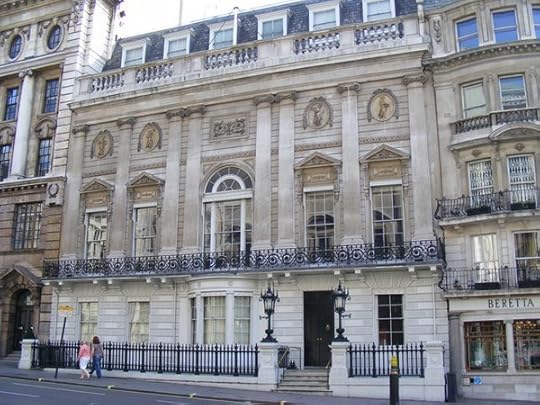
White's is a gentleman's club in St James's, in London.
Link to remainder of article:
https://en.wikipedia.org/wiki/White%27s
Source: Wikipedia

White's is a gentleman's club in St James's, in London.
Link to remainder of article:
https://en.wikipedia.org/wiki/White%27s
Source: Wikipedia
message 226:
by
Bentley, Group Founder, Leader, Chief
(last edited Aug 03, 2020 07:50PM)
(new)
-
rated it 4 stars
H. R. Knickerbocker
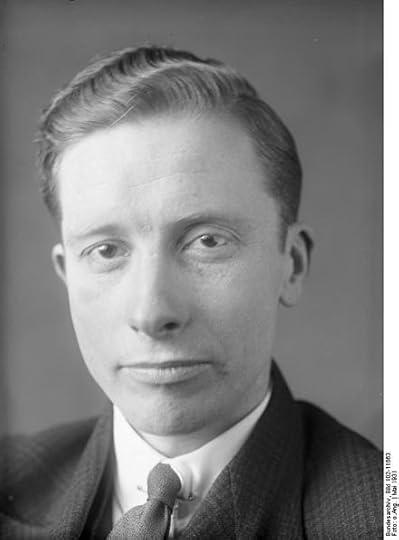
(Hubert Renfro Knickerbocker)
Hubert Renfro Knickerbocker (January 31, 1898 – July 12, 1949) was an American journalist and author. He was nicknamed "Red" from the color of his hair.
Link: https://en.wikipedia.org/wiki/Hubert_...

(Hubert Renfro Knickerbocker)
Hubert Renfro Knickerbocker (January 31, 1898 – July 12, 1949) was an American journalist and author. He was nicknamed "Red" from the color of his hair.
Link: https://en.wikipedia.org/wiki/Hubert_...
message 227:
by
Bentley, Group Founder, Leader, Chief
(last edited Aug 03, 2020 08:44PM)
(new)
-
rated it 4 stars
This is another sensationalistic portrayal - (not altogether flattering for Winston using his daughter in law this way especially since she is married to his son nor for Pamela Churchill).
It is an interesting portrayal of her strong connection to Winston Churchill - her father in law (not sure of the accuracy of this portrayal but entertaining video)
Link: https://youtu.be/l9W_Ar0YY5Y
 by
by
 Michael Dobbs
Michael Dobbs
 by Christopher Ogden (no photo)
by Christopher Ogden (no photo)
Source: Youtube
It is an interesting portrayal of her strong connection to Winston Churchill - her father in law (not sure of the accuracy of this portrayal but entertaining video)
Link: https://youtu.be/l9W_Ar0YY5Y
 by
by
 Michael Dobbs
Michael Dobbs by Christopher Ogden (no photo)
by Christopher Ogden (no photo)Source: Youtube
message 228:
by
Bentley, Group Founder, Leader, Chief
(last edited Aug 04, 2020 09:11PM)
(new)
-
rated it 4 stars
And so we begin:
CHAPTER 27
Directive No. 17
"AS PLANNING FOR THE INVASION of England progressed, Hitler issued a new directive, No. 17, which called for an all-out assault on the RAF.
“The German Air Force is to overpower the English Air Force with all the forces at its command, in the shortest possible time,” Hitler wrote.
“The attacks are to be directed primarily against flying units, their ground installations, and their supply organizations, but also against the aircraft industry, including that manufacturing anti-aircraft equipment.”
Hitler reserved to himself “the right to decide on terror attacks as measures of reprisal.” His continued reluctance to authorize raids against central London and the civilian districts of other big cities had nothing to do with moral distaste but, rather, stemmed from his continued hope for a peace deal with Churchill and a wish to avoid reprisal raids on Berlin.
This new campaign against the RAF was a milestone in the history of warfare, according to the Luftwaffe’s own later assessment. “For the first time…an air force was going to conduct, independent of operations by other services, an offensive which aimed at decisively smashing the enemy air force.”
The question was, Could air power alone “undermine the general fighting power of the enemy by massed air attacks until he is ready to sue for peace?”
More:
https://www.cia.gov/library/readingro...
https://ww2today.com/1st-august-1940-...
https://yalebooksblog.co.uk/2015/09/1...
Sources: Larson, Erik. The Splendid and the Vile (p. 152). Crown. Kindle Edition, CIA. World War II Today
 by Robin Prior (no photo)
by Robin Prior (no photo)
Discussion Questions and Topics:
1. What was Directive 17 and what was unique about it? What kind of terror attacks were planned as reprisals - sounds quite ominous?
2. How did Goring miscalculate once again?
CHAPTER 27
Directive No. 17
"AS PLANNING FOR THE INVASION of England progressed, Hitler issued a new directive, No. 17, which called for an all-out assault on the RAF.
“The German Air Force is to overpower the English Air Force with all the forces at its command, in the shortest possible time,” Hitler wrote.
“The attacks are to be directed primarily against flying units, their ground installations, and their supply organizations, but also against the aircraft industry, including that manufacturing anti-aircraft equipment.”
Hitler reserved to himself “the right to decide on terror attacks as measures of reprisal.” His continued reluctance to authorize raids against central London and the civilian districts of other big cities had nothing to do with moral distaste but, rather, stemmed from his continued hope for a peace deal with Churchill and a wish to avoid reprisal raids on Berlin.
This new campaign against the RAF was a milestone in the history of warfare, according to the Luftwaffe’s own later assessment. “For the first time…an air force was going to conduct, independent of operations by other services, an offensive which aimed at decisively smashing the enemy air force.”
The question was, Could air power alone “undermine the general fighting power of the enemy by massed air attacks until he is ready to sue for peace?”
More:
https://www.cia.gov/library/readingro...
https://ww2today.com/1st-august-1940-...
https://yalebooksblog.co.uk/2015/09/1...
Sources: Larson, Erik. The Splendid and the Vile (p. 152). Crown. Kindle Edition, CIA. World War II Today
 by Robin Prior (no photo)
by Robin Prior (no photo)Discussion Questions and Topics:
1. What was Directive 17 and what was unique about it? What kind of terror attacks were planned as reprisals - sounds quite ominous?
2. How did Goring miscalculate once again?
message 229:
by
Bentley, Group Founder, Leader, Chief
(last edited Aug 04, 2020 07:31PM)
(new)
-
rated it 4 stars
You know one thing that is interesting about today's moral climate - for example - Winston Churchill did so much for Britain (although he was human with flaws); but there is no doubt that he is iconic and revered.
But in today's world when these iconic figures like Winston Churchill and so many others are unfairly vilified after their demise - there is no way for these gigantic and important men and women to strike back or even defend themselves.
Iconic figures like Churchill would be able to "eviscerate" their attackers with their responses or with simply their pens.
I doubt that these attackers and bullies would have the courage to stand up to these giants when they were alive. But I have never seen this distasteful phenomena - until recently - that a person who is long departed is vilified (John McCain comes to mind, Winston Churchill, John Lewis recently)
To me it just seems that some individuals like to rewrite history or diminish our iconic figures - trying to make them look small and/or just tarnish their memory.
Folks who do that sort of thing - to the memories of the departed - those heroes - who were once iconic figures - are even made smaller in stature than they already were.
Any comments on today's moral climate? Pro or Con?
Disclosure: Churchill has always been one of my favorite topics - may he RIP.
But in today's world when these iconic figures like Winston Churchill and so many others are unfairly vilified after their demise - there is no way for these gigantic and important men and women to strike back or even defend themselves.
Iconic figures like Churchill would be able to "eviscerate" their attackers with their responses or with simply their pens.
I doubt that these attackers and bullies would have the courage to stand up to these giants when they were alive. But I have never seen this distasteful phenomena - until recently - that a person who is long departed is vilified (John McCain comes to mind, Winston Churchill, John Lewis recently)
To me it just seems that some individuals like to rewrite history or diminish our iconic figures - trying to make them look small and/or just tarnish their memory.
Folks who do that sort of thing - to the memories of the departed - those heroes - who were once iconic figures - are even made smaller in stature than they already were.
Any comments on today's moral climate? Pro or Con?
Disclosure: Churchill has always been one of my favorite topics - may he RIP.
message 230:
by
Bentley, Group Founder, Leader, Chief
(last edited Aug 04, 2020 06:59PM)
(new)
-
rated it 4 stars
Führer Directive 17: For the Conduct of Air and Sea Warfare against England (Battle of Britain) (August 1, 1940)
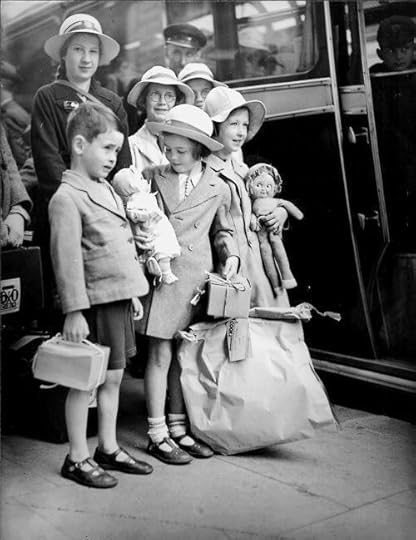
Figure 1.--After a string of incredible victories, the German Panzers reached the Channel. Given that the Lufwaffe had been an important part of the German Blitzkrirg victories, the Germans had defeated the French as well. Most military experts believed that the Battle of Britain would be another quick German victory. The American Ambassador, Joseph Kennedy, reported that in his cables. And because the Chamberlain appeasement Government had restricted funding, the Royal Air Force (RAF) was badly outnumbered with a small number of trained pilots. Fortunately for Britain they had radar which was a force magnifier which the Germans did not appreciate. The first step when war was declared was to get the children out of the city. The Luftwaffe was a tactical, ground support staff and that is how the Lufftwaffe commanders wanted it, focus on the RAF forward bases. When victory did not come quickly. Hitler exerted his preferences--terror bombing the cities, put the kids and other civilians on the front line. Even before the fighting began, Hitler indicated, "I reserve to myself the right to decide on terror attacks as measures of reprisal." It should be understood that in NAZI parlance, reprisals were called for when their victims resisted in anyway. Even in the Holocaust, killing operations were described as reprisals when the victims were not resisting.
Link to article: https://www.histclo.com/bio/h/hitler/...
Source: Children in History

Figure 1.--After a string of incredible victories, the German Panzers reached the Channel. Given that the Lufwaffe had been an important part of the German Blitzkrirg victories, the Germans had defeated the French as well. Most military experts believed that the Battle of Britain would be another quick German victory. The American Ambassador, Joseph Kennedy, reported that in his cables. And because the Chamberlain appeasement Government had restricted funding, the Royal Air Force (RAF) was badly outnumbered with a small number of trained pilots. Fortunately for Britain they had radar which was a force magnifier which the Germans did not appreciate. The first step when war was declared was to get the children out of the city. The Luftwaffe was a tactical, ground support staff and that is how the Lufftwaffe commanders wanted it, focus on the RAF forward bases. When victory did not come quickly. Hitler exerted his preferences--terror bombing the cities, put the kids and other civilians on the front line. Even before the fighting began, Hitler indicated, "I reserve to myself the right to decide on terror attacks as measures of reprisal." It should be understood that in NAZI parlance, reprisals were called for when their victims resisted in anyway. Even in the Holocaust, killing operations were described as reprisals when the victims were not resisting.
Link to article: https://www.histclo.com/bio/h/hitler/...
Source: Children in History
message 231:
by
Bentley, Group Founder, Leader, Chief
(last edited Aug 04, 2020 07:43PM)
(new)
-
rated it 4 stars
What were your thoughts about the focus of Hitler's strategy?
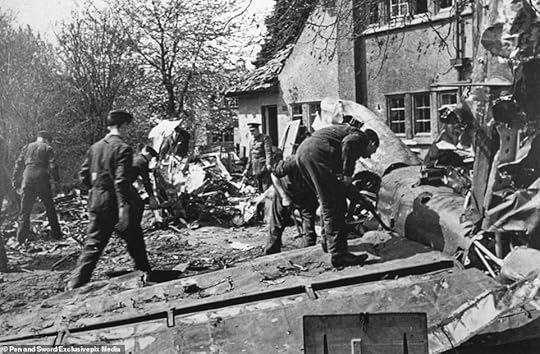
This was the aftermath when a Heinkel 111 of 3./KGr126 was hit and disabled by the Harwich anti- aircraft battery before crashing out of control into houses at Victoria Road, Clacton-on-Sea, killing all four crew members. On board were three 'C' type mines, two of which exploded in the crash. The subsequent fire, which destroyed a number of houses and damaged many more, killed two civilians and injured another 150
Hitler stated: “The attacks are to be directed primarily against flying units, their ground installations, and their supply organizations, but also against the aircraft industry, including that manufacturing anti-aircraft equipment.”
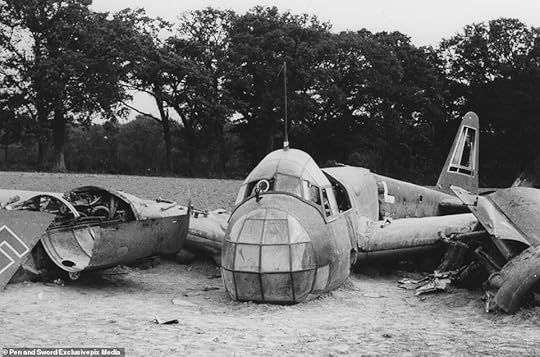
This Junkers 88, with its broken back, was shot down on 9 September 1940 at Newells Farm, Nuthurst, West Sussex, where it had been substantially 'got at' by souvenir hunters when this photograph was taken. The swastikas that had been stripped from the tail were found when police apprehended a man and made him leave them at the site.
Sources: Larson, Erik. The Splendid and the Vile (p. 152). Crown. Kindle Edition, The Daily Mail

This was the aftermath when a Heinkel 111 of 3./KGr126 was hit and disabled by the Harwich anti- aircraft battery before crashing out of control into houses at Victoria Road, Clacton-on-Sea, killing all four crew members. On board were three 'C' type mines, two of which exploded in the crash. The subsequent fire, which destroyed a number of houses and damaged many more, killed two civilians and injured another 150
Hitler stated: “The attacks are to be directed primarily against flying units, their ground installations, and their supply organizations, but also against the aircraft industry, including that manufacturing anti-aircraft equipment.”

This Junkers 88, with its broken back, was shot down on 9 September 1940 at Newells Farm, Nuthurst, West Sussex, where it had been substantially 'got at' by souvenir hunters when this photograph was taken. The swastikas that had been stripped from the tail were found when police apprehended a man and made him leave them at the site.
Sources: Larson, Erik. The Splendid and the Vile (p. 152). Crown. Kindle Edition, The Daily Mail
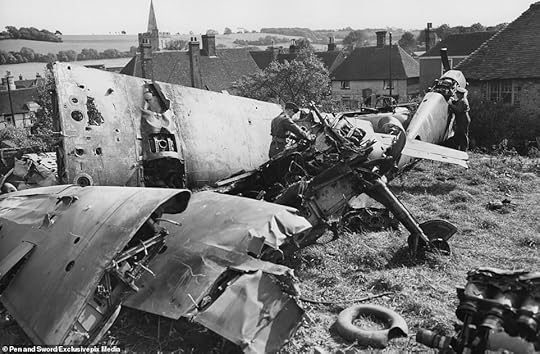
Such was the volume of aircraft being shot down in the East Kent area that a temporary 'holding' depot was established at Elham in Kent where assorted wreckages of locally-crashed aircraft were assembled prior to removal to RAF Faygate before further processing and despatch to the Northern Aluminum Company depot at Banbury
Source: The Daily Mail
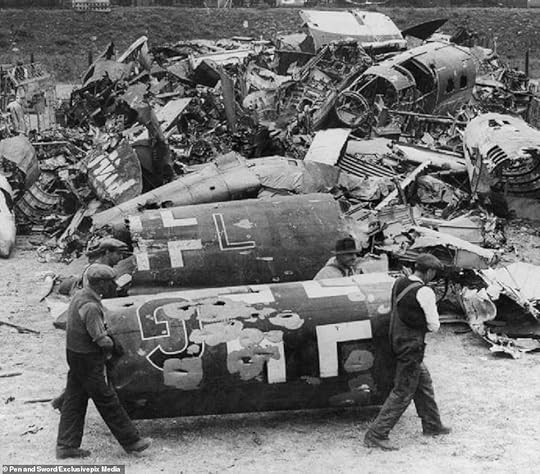
At the Banbury processing plant, workers carry a section of the Dornier 17 fuselage brought from the crash site at Paddock Wood on 3 July 1940 (see page 19). A mass of other enemy aircraft wreckages await the smelter
Source: The Daily Mail
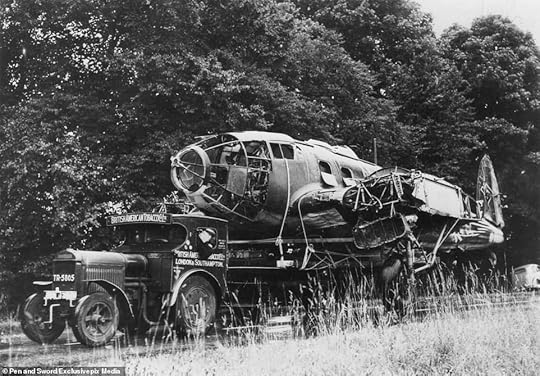
Other haulage firms, too, were enlisted to collect and transport aircraft wreckages. Bizarrely, though, this lorry belonged to the British American Tobacco Company Ltd but has been press-ganged into moving a Heinkel 111 rather than cigarettes. Very much an over-sized load, it will be seen that the main landing wheels are running on the road either side of the lorry bed and almost acting like outrigger stabiliser wheels
Source: The Daily Mail
message 235:
by
Bentley, Group Founder, Leader, Chief
(last edited Aug 04, 2020 07:49PM)
(new)
-
rated it 4 stars
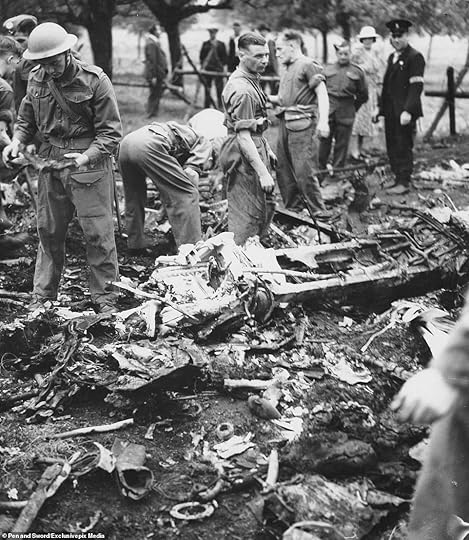
Soldiers pick amongst all that is left of a Junkers 88, shot down at Church Farm, Aylesford on 18 August 1940. The aircraft has been comprehensively smashed to pieces with only the main wing-spar identifiable in this photo- graph. Crash Inspector Pilot Officer Bernard Clarke was assigned to visit this crash site where he noted: 'Scrap only'
Source: The Daily Mail
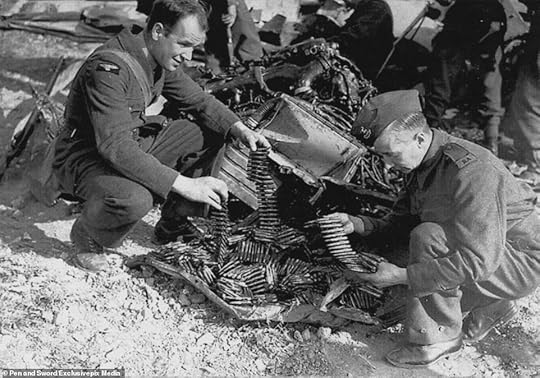
This time an RAF airman and a Royal Artillery soldier examine belted 7.92mm rounds in the wreckage of a Messerschmitt 109 shot down at Chelsham, near RAF Biggin Hill on 30 August 1940. Bullets were popular although dangerous souvenirs, and became valuable 'currency' to schoolboy collectors. The fact that bullets or cannon shells were live and dangerous mattered little to collectors.
Source: The Daily Mail
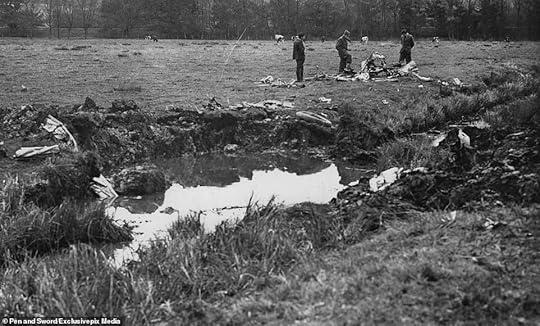
There was hardly anything left here, let alone bullets, for anybody to pick up. Looking more like a bomb crater, this was where a Messerschmitt 109 impacted into a drainage ditch on Brede Marshes at Guestling in East Sussex on 25 October 1940 after its pilot had baled out injured and into captivity. Such was the force of the impact in the soft ground that the aircraft has almost entirely disappeared.
Source: The Daily Mail
message 238:
by
Bentley, Group Founder, Leader, Chief
(last edited Aug 04, 2020 07:55PM)
(new)
-
rated it 4 stars
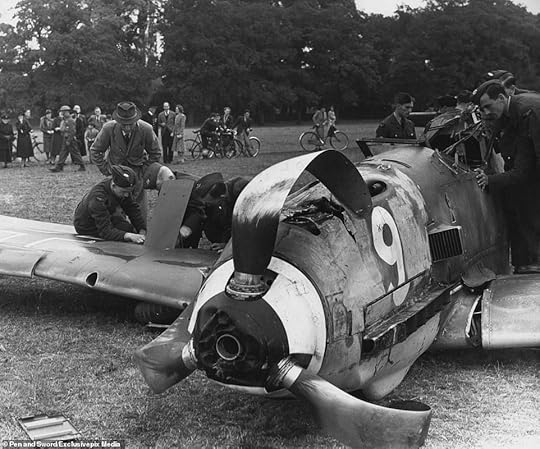
Righted by the Coles crane, the Messerschmitt 109 is subject to eager attention by the RAF salvage gang. One group are intent on the wing gun and its ammunition while another party seem more interested in what they can find in the cockpit
Source: The Daily Mail
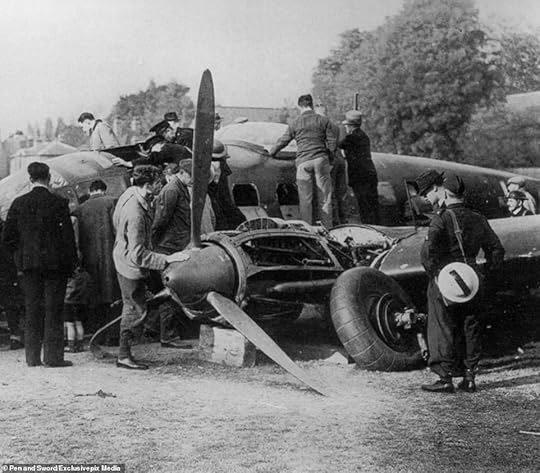
A downed Heinkel aircraft was taken from Hildenborough on to Mitcham Common in Surrey where it again drew crowds and yet more pennies for the coffers of the Spitfire Fund
Source: The Daily Mail
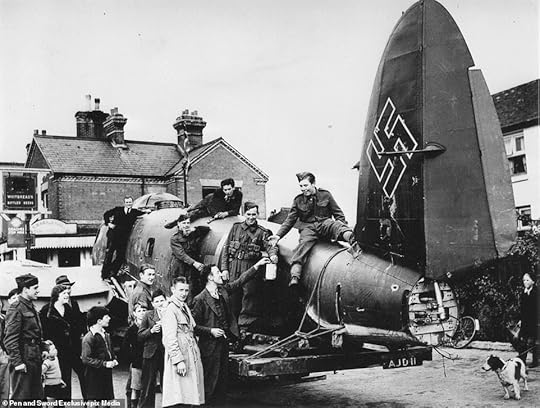
This Heinkel 111 is on temporary display in the front car park of The Half Moon pub at Hildenborough in Kent, and only a very short distance from where it was shot down on 11 September 1940. A civilian lorry has been pressed into service to take the wreck away.
Source: The Daily Mail
message 241:
by
Bentley, Group Founder, Leader, Chief
(last edited Aug 04, 2020 07:59PM)
(new)
-
rated it 4 stars

It wasn't just the transport that sometimes had a hard job. Here, a party from 49 MU drags sections of a crashed aircraft across a Kent hop field. Judging by the empty hop garden and the warm clothing this is either very early in 1940 or much later in the year.
Source: The Daily Mail
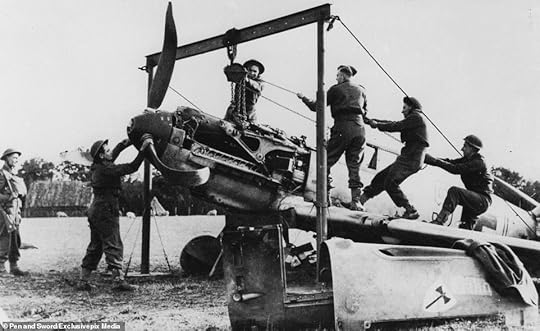
The Royal Engineers lend a hand, helping with a gantry and block-and-tackle as they lift the Messerschmitt 109 flown by Oblt Egon Troha of 9./JG3 who made a forced-landing with a damaged radiator at Westcourt Farm, Sheperdswell, Kent on 29 October 1940
Source: The Daily Mail
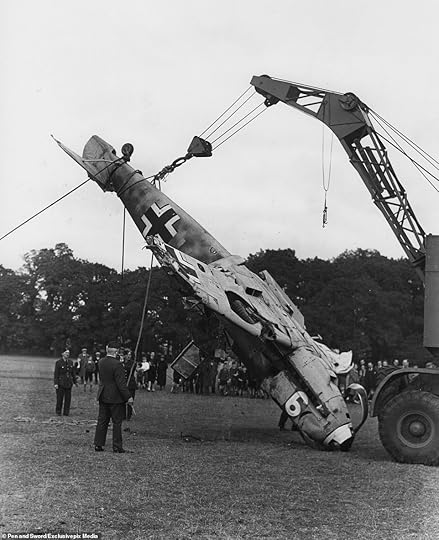
A crane picks up an inverted Messerschmitt on 30 September 1940 in Windsor Great Park when a Messerschmitt 109 of 7./JG27 made a forced-landing there after being damaged by fighters during a bomber escort mission to London. In executing the emergency landing, Oblt Karl Fischer's Me 109 turned over onto its back although, miraculously, Fischer was captured unhurt after what could easily have been a fatal crash.
Source: The Daily Mail
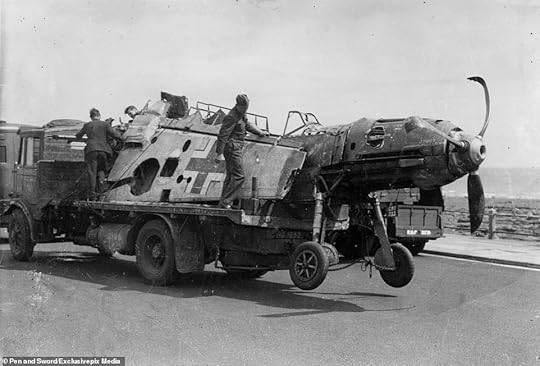
This is the Messerschmitt 109 of Ofw J. Harmeling from 4./LG2 that was shot down at Langenhoe Wick in Essex on 29 October 1940, although this photograph was taken at Victoria Park, Arbroath during 1941 whilst being used for a Spitfire Fund Raising tour of Scotland which included appearances at Glasgow, Stonehaven and Laurencekirk
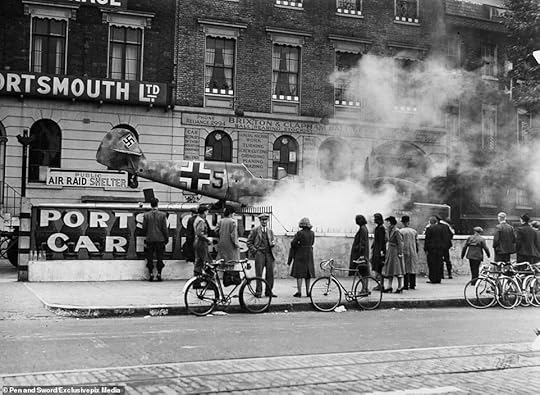
A Messerschmitt 109 was photographed on an RAF Maintenance Unit Queen Mary low-loader in London during October 1940 outside offices at 161 Clapham Road belonging to another civilian contractor engaged by the Air Ministry for the recovery of aircraft wrecks, Portsmouth Carriers Ltd
Source: The Daily Mail

On 3 October 1940 a Messerschmitt plane was displayed to raise money for the Royal Borough of Windsor's Spitfire Fund. During that time the German fighter was visited by the Princesses Elizabeth and Margaret, with Princess Elizabeth being allowed to sit in the pilot's seat.
Source: The Daily Mail
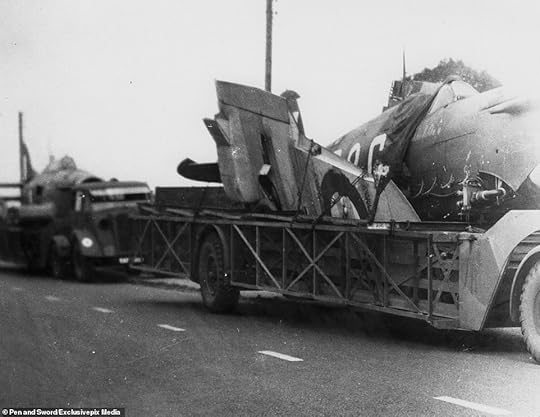
Transporting away aircraft like Hurricane V6799 was generally carried out using the RAF Maintenance Unit Queen Mary trailers like these. Here, a damaged Hurricane and a Spitfire are removed for either repair or spares recovery.
Source: The Daily Mail
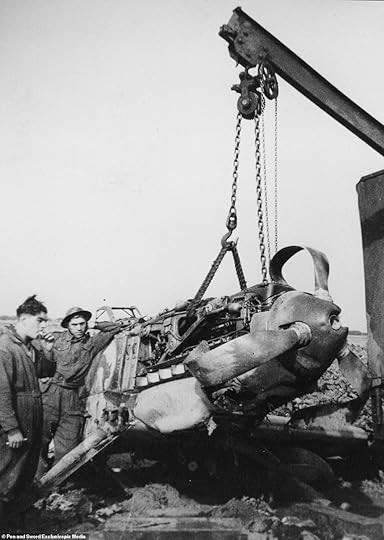
Here was another job for the MU gangs, a Messerschmitt 109. This time, Gefreiter Bogasch's aircraft is recovered from Northbourne Park near Sandwich after being shot down there on 27 September 1940. It is being lifted with the help of a Royal Engineer party and a lorry-mounted gantry crane, although the recovery party seem singularly disinterested by the task in hand.
Source: The Daily Mail
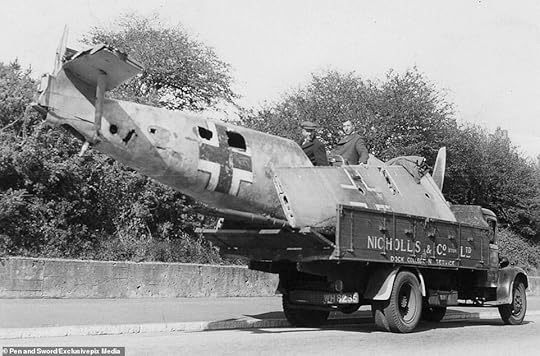
Substantially intact was this Messerschmitt 109 of 3./JG52 which had been shot down at Penshurst Aerodrome, Kent on 27 October 1940. Its pilot, Fw Shieverhofer, was taken prisoner - allegedly by the Spitfire pilot of 74 Squadron who had shot him down and who immediately put down on the Penshurst landing ground to ensure the Luftwaffe pilot's capture. A rather precariously overhanging load is counterbalanced by its heavy DB 601 engine.
Source: The Daily Mail
message 250:
by
Bentley, Group Founder, Leader, Chief
(last edited Aug 04, 2020 08:33PM)
(new)
-
rated it 4 stars
This is a video - archival of German planes exploding - Battle for Britain filmed by gun cameras
Link: https://www.dailymail.co.uk/news/arti...
Note: War is very sad and each one of these downed planes represents a son who was lost to a family. But for survival - Britain had no choice; but to defend itself and so many were lost of their sons as well. Lost family members were shared universally across all countries in the war.
Source: The Daily Mail
Link: https://www.dailymail.co.uk/news/arti...
Note: War is very sad and each one of these downed planes represents a son who was lost to a family. But for survival - Britain had no choice; but to defend itself and so many were lost of their sons as well. Lost family members were shared universally across all countries in the war.
Source: The Daily Mail
Books mentioned in this topic
Franklin Delano Roosevelt: Champion of Freedom (other topics)The Patriarch: The Remarkable Life and Turbulent Times of Joseph P. Kennedy (other topics)
The Kennedys Amidst the Gathering Storm: A Thousand Days in London, 1938-1940 (other topics)
Dunkirk Lib/E: The History Behind the Major Motion Picture (other topics)
America's Global Role: Essays and Reviews on National Security, Geopolitics, and War (other topics)
More...
Authors mentioned in this topic
Conrad Black (other topics)David Nasaw (other topics)
Will Swift (other topics)
Joshua Levine (other topics)
Francis Sempa (other topics)
More...





Week Ten - July 27th - August 2nd
Chapter 27: Directive No. 17
Chapter 28: “Oh, Moon, Lovely Moon” Part Three: Dread
Chapter 29: Eagle Day